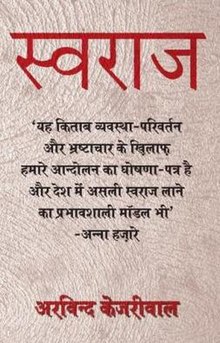| Revision as of 14:36, 28 August 2015 edit120.59.75.111 (talk)No edit summary← Previous edit | Revision as of 14:37, 28 August 2015 edit undo120.59.75.111 (talk)No edit summaryNext edit → | ||
| Line 4: | Line 4: | ||
| | image = Cover of Swaraj book ,by Arvind Kejriwal.jpeg | | image = Cover of Swaraj book ,by Arvind Kejriwal.jpeg | ||
| | caption = Cover page of 2012 print by Harper Collins India. | | caption = Cover page of 2012 print by Harper Collins India. | ||
| | country |
| country india | ||
| | language = ], English, ], ] | | language = ], English, ], ] | ||
Revision as of 14:37, 28 August 2015
 Cover page of 2012 print by Harper Collins India. Cover page of 2012 print by Harper Collins India. | |
| Author | Arvind Kejriwal and others |
|---|---|
| Language | Hindi, English, Malayalam, Marathi |
| Subject | history |
| Genre | Democratic framework of India |
| Publication date | 2012 (HarperCollins) |
| Pages | 1000 |
| ISBN | ISBN 9788172237677 Parameter error in {{ISBNT}}: invalid character |
Swaraj is a 2012 book by the Indian social activist-turned-politician Arvind Kejriwal, who credits several people with writing it. Published in several languages, including English, Hindi and Malayalam, the book questions the existing democratic framework in India and proposes a way how the people of India can achieve true Swaraj (self-rule). The book was originally published in 2010 by Swaraj Abhiyan Prakashan.
About the book
Swaraj presents a model of governance based on Gandhi's concept of Swaraj or "Home-Rule". Its central point is that power, which is concentrated in the hands of a few individuals in New Delhi and state capitals, must be vested to gram sabhas and mohalla sabhas (Not to be confused with gram or khap panchayats) so that the people may be empowered to take decisions affecting their lives. Citing examples of the Participatory budgeting model of Porto Alegre, the direct democracy model of Switzerland and USA, and the development model implemented by Popatrao Pawar, it proposes a model of governance wherein a sarpanch or local official can take decisions only with the consent of all the people of the village or town. Swaraj also addresses the social concerns of Indians. The book also mentions how India's natural resources are being looted by some crony corporates in alliance with corrupt politicians and how the nation of 1.2 billion is suffering because of a million corrupt people.
Kejriwal announced in September 2011 that he and others had completed the writing of Swaraj. It was published by HarperCollins and was launched on 29 July 2012 at Jantar Mantar in New Delhi. At the time of launch, Kejriwal said "The book highlights the shortcomings of the current model of centralised governance and explains how the real rule of the people can be brought about." He also said that he would not be earning any royalty from its sale as he wants to reach as many people as possible. Anti-corruption activist and Gandhian Anna Hazare wrote the foreword for the book.
The book has been translated to other Indian languages, such as Oriya.
References
- Sivanand, Mohan (3 September 2011). "Arvind Kejriwal's Quest for Change". Reader's Digest. Retrieved 4 February 2014.
- ^ "Arvind Kejriwal launches book on Team Anna's 'struggle' : North, News - India Today". Indiatoday.intoday.in. 2012-07-30. Retrieved 2012-12-26.
- "Self-Sacrifice Can Bring Real Swaraj". The Pioneer. PNS. 16 April 2013. Retrieved 16 June 2013.